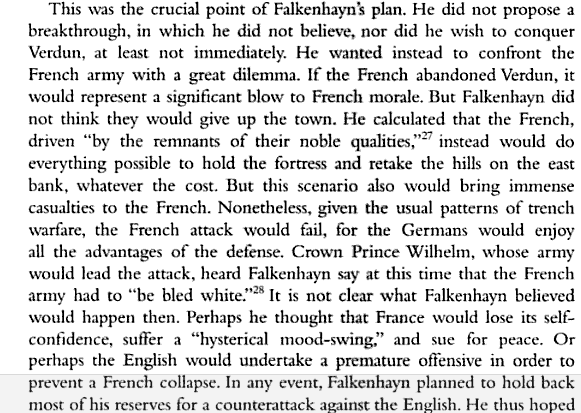Hey, arrogant assclown.when it looks more like you couldn't tell a tank from a trench let alone why any of it mattered. We could have fucking gotten to what you wanted in a logical process, but you apparently know everything already anyway.
I do already fucking know the debate about Haig's generalship about Somme/Passchendaele. From both sides. Want a quick summary?
The Somme:
Anti-Haig Argument: The Somme was an enormous pointless waste of lives, which sent tens of thousands of British troops to their deaths. It was bungled because Haig was too ambitious and tried out too many new tactics at the same time... without testing if any of them actually worked.
In particular, artillery fire that was supposed to wipe out the Germans failed to do so despite millions of shells being fired. It even failed to cut the barbed wire which meant many British troops got trapped in no man's land and were machine gunned (Keegan, The Face of Battle).
And all this happened while Haig was dining in the rear of the lines in his chateue, imagining that he was about to breakthrough the German lines and reach the Ruhr.
Pro-Haig Argument: The Somme, while a regrettable loss of lives, was an important attritional battle that tied down the German troops and relieved pressure from the French fighting a massive battle at Verdun. Despite the massive losses on the first day, several Divisions actually achieved their objectives and as the battle wore on less mistakes were made until casualties were almost on a 1:1 ratio (depending on which German sources you believe). This exchange rate was ultimately a good thing because the British, French, and Russian populations far outnumbered the Germans and they could readily trade soldiers 1:1.
Moreover, the charge that Haig didn't care about his men doesn't hold much water. After the war he set up a foundation to help veterans of the war. That he dined comfortably in the rear while his men died by the thousands was a product of technological limitations. Frontline soldiers didn't have radios. Their telephone wires were often cut. Their only option was to rely on messengers, who often arrived late or were killed enroute.
Haig thus couldn't really direct the battle once it had started, and to expose himself on the frontlines "to be with the troops" would have been irresponsible. Certainly, when Eisenhower went comfortably to bed after D-Day while men were still dying in Normandy nobody really complained. It's simply NOT the C-in-C's job to be at the frontlines anymore.
Passchendaele:
Anti-Haig argument: Haig ordered pointless attacks over terrain that had basically turned into mud. His own chief of staff burst into tears after he realized that kind of terrain they had sent their men into.
This was despite warnings from his subordinates that he would lose very many men - Currie even predicting almost the exact number of men they'd lose.
Pro-Haig argument: The French army was mutinying at the time, so the British had to launch an offensive to tie the Germans down. That the Germans did not take advantage of the mutinies was simply fortune on the Allies' part. Moreover despite the terrible terrain losses again were almost equal - and with the US, French, and British manpower far outstripping the Germans it was again profitable to engage in battles of attrition against them.
----
So again, fuck you and your "Zine doesn't know the facts". I know them. They've been done to death elsewhere. So stop whining when I ask for a very specific set of information (The Hundred Days) about the performance of Haig!
I want info on the Hundred Days because that's where I'm lacking information. That is it. And that you and Remnant imply that I am focusing on the Hundred Days to support some conclusion is just you not wanting to admit that you haven't actually said anything about the Hundred Days. AT ALL.
Instead you want to go swimming around in the mud of the Somme/Passchedale and the post-war Haig debate and claim that it will somehow, someway, lead back to his performance during the Hundred Days.
And yet that's simply not happening. Not because I'm shooting down your baseless personal attacks. But because the post-war squabbles between Lloyd George and Haig really don't have any fucking bearing on what happened in 1918.
Really, why don't you just admit "I don't know enough about the Hundred Days to comment on it" and be done with it? This was not supposed to be an easy question.


